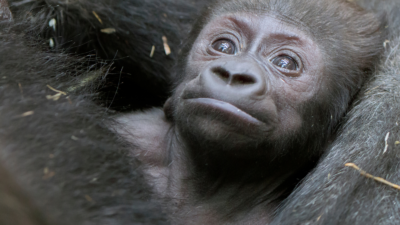
Kelechukwu Iruoma, WildAid Nigeria Representative
Nigeria is rich in biodiversity. The country is blessed with unique animals who help to conserve and maintain the ecosystem. One such animal is the Cross River gorilla, a unique species home to Nigeria, who lives in the mountainous border area of Nigeria and Cameroon.
Cross River gorilla is Africa’s most threatened ape, with a population estimated at fewer than 300 individuals. Around 100 live in Nigeria and are found only in three protected areas in Cross River state: Afi Mountain Wildlife Sanctuary, Mbe Mountains, and the Okwangwo division of Cross River National Park.
The Cross River gorilla plays a significant role in keeping the forests alive and healthy. They keep the forests rejuvenated by ensuring seed dispersal that certain plants rely on solely for propagation, feeding, and nesting activities, letting in light to the forest floor and shaping plant communities and diversity.
Gorillas are known as umbrella species, which ensure the survival of other wildlife, including endangered species found in their habitats.
But in the last two decades, illegal activities such as bushmeat hunting, logging, expansion of settlements, and agricultural encroachment have continued to destroy their habitats and threaten the survival of the rare Cross River gorilla. Snares intended for other animals for bushmeat often trap Cross River gorillas, injuring them as well as killing the great apes.
The Cross River gorillas are disappearing and are listed in the International Union for Conservation of Nature (IUCN) red list as Critically Endangered.
The global population of gorillas stands about 1,000 and are found in countries such as Nigeria, Rwanda, the Democratic Republic of Congo, and Uganda, which is home to over 50 percent of the gorilla’s global population, the highest in the world. While Uganda makes billions of dollars in gorilla tourism, Nigeria’s gorillas continue to face danger while the population depletes.
Gorillas provide an important draw for Uganda’s tourism industry, which contributes 7.75% of its GDP and 6.7% of total national employment in 2018, according to research by the African Nature Based Tourism Platform. It costs $1,500 for tourists to see gorillas in Rwanda for an hour and tickets are always fully booked months before.
As the world marks World Gorilla Day on September 24, a moment set apart to celebrate the iconic gorilla, we support Nigeria in taking action to protect the remaining Cross River gorillas. World Gorilla Day creates the opportunity for people all over the world to come together in celebrating gorillas, and more importantly, take action to protect gorillas in the wild.
It is not too late to save Nigeria’s remaining 100 Cross River gorillas, but we need to act now to protect them. All stakeholders must come together to contribute their quote to restoring our gorilla population.
Individuals and communities, especially those close to the forests and national parks, need to be enlightened and sensitized on the need to protect our gorillas. We also encourage the Nigerian government to strengthen its wildlife laws to combat critical threats facing our iconic gorillas.
Stay in touch and get the latest WildAid updates.
SIGN UPAbout WildAid
WildAid is a non-profit organization with a mission to protect wildlife from illegal trade and other imminent threats. While most wildlife conservation groups focus on protecting animals from poaching, WildAid primarily works to reduce global consumption of wildlife products such as elephant ivory, rhino horn and shark fin soup. With an unrivaled portfolio of celebrity ambassadors and a global network of media partners, WildAid leverages more than $308 million in annual pro-bono media support with a simple message: When the Buying Stops, the Killing Can Too.
Journalists on deadline may email communications@wildaid.org